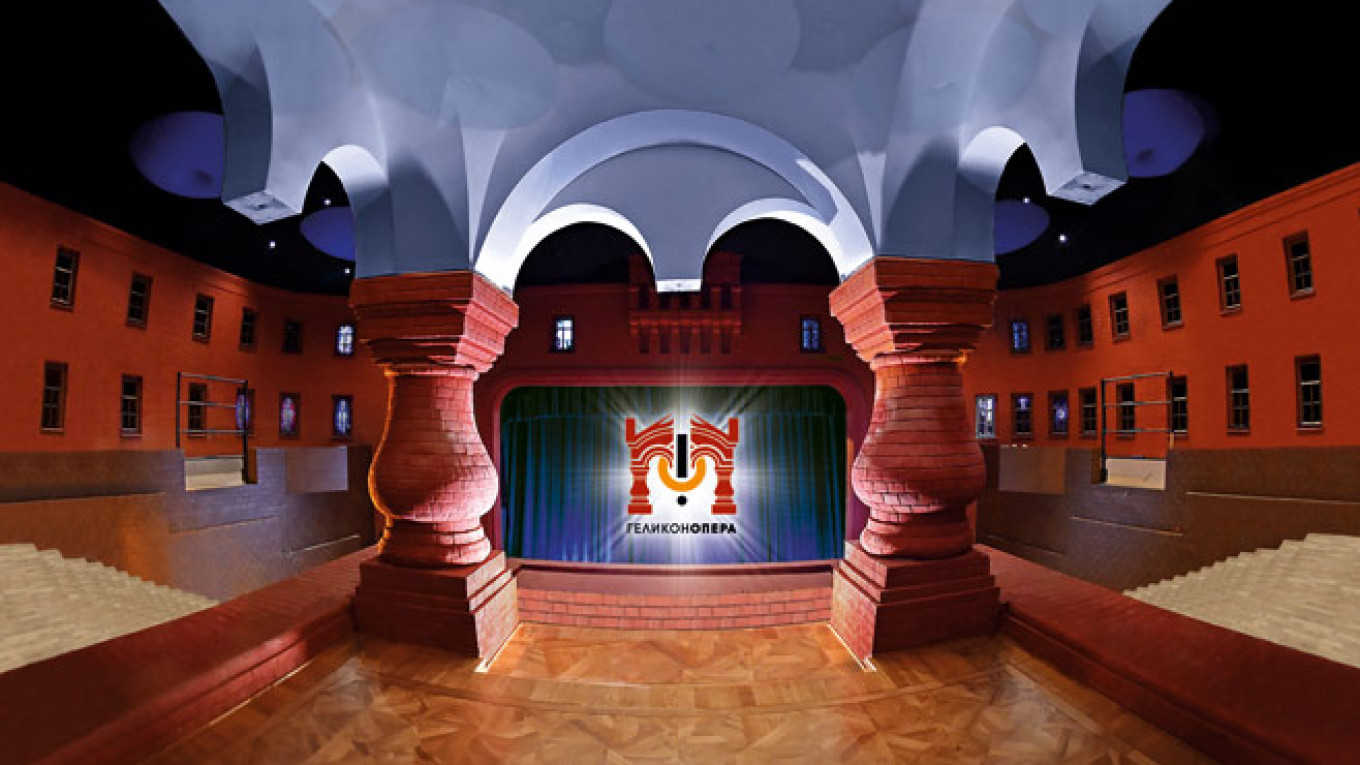Moscow's Helikon Opera ushered in the season in grand style, showing off its newly restored main stage at the opening gala concert yesterday. But conservationists say it did so at the expense of the 19th-century palace which had housed it since its founding in 1990.
When it was founded nearly 25 years ago, it the Helikon quickly established itself as the city's "irreverent" opera company, often shunning a mainstream repertory in favor of Russian and foreign works that had been neglected during the Soviet period. Its productions of operatic classics have also been anything but classical. In 2004, it shocked Parisian audiences with its go-getter, chain-smoking Carmen meeting her tragic end in a Moscow alley.
Now, however, the architectural conservation movement Arkhnadzor claims that the Helikon's love for novelty has brought about the destruction of a historical site.
The 8-year redevelopment of the Shakhovskoi-Glebov-Streshneva family estate culminated in the construction of a brand new theater building.
"The area of the theater has increased fivefold after restoration," the opera company said in a press release.
"Thanks to the Moscow city government, and personally to mayor Sergei Sobyanin and the deputy mayor for urban development, Marat Khusnullin, the half-ruined Shakhovskoi-Glebov-Streshneva estate has been transformed into a modern theatre site."
This transformation, however, met with sharp criticism from Arkhnadzor, a popular movement formed in 2009 by representatives of six Moscow-based conservation societies.
"The estate is indeed half-ruined," the activists wrote yesterday in an online post entitled, "The Phantom of the Opera." "Quite literally, half of it is ruined, thanks to the decisions of [Sobyanin and Khusnullin], Moscow's former mayor Yuri Luzhkov, former deputy mayor for urban development V. I. Resin, and other members of the current and former city authorities."
The movement had previously tried to stop the redevelopment of the estate. In October 2010, the Moscow city government decided to halt the ongoing works as a result of Akhnadzor protests and subsequent public discussions.
The works resumed in June 2011 over protests from Arkhzadzor.
"The Skakhovskoi estate was an architectural monument of federal importance," the movement stated in an online post yesterday. "In 2010 and 2011, Rosokhrankultura headed by Alexander Kibovsky, and subsequently Moscow's cultural heritage department, which he led, claimed that palace's postal address [as given in Russia's cultural heritage register] referred to just one of its buildings."
Former deputy mayor Khusnullin was quoted by RBC as saying that the work could not be stopped, as over a billion rubles from the city budget had already been invested in it.
Helikon's creative director Dmitry Bertman told Rossiyskaya gazeta that Arkhnadzor "had continuously twisted facts" related to the Skakhovskoi estate's case.
The press office of Moscow's cultural heritage department was not available for comment.
Regardless of the acrimonious back story, Russia's most celebrated singers took part in the gala opening, with baritone Dmitri Hvorostovsky giving his second performance in Moscow after undergoing an operation for a brain tumor. International stars included the mezzo-soprano Olga Borodina, the Latvian tenor Alexander Antonenko, and the Albanian soprano Inva Mula, who sang the role of the Diva Plavalaguna in Luc Besson's "The Fifth Element" earned her a place in popular culture.
Upcoming performances include "Sadko" by Nikolai Rimsky-Korsakov, "Dialogues of the Carmelites" by Francis Poulenc, and Mozart's "The Marriage of Figaro."
Contact the author at [email protected]
A Message from The Moscow Times:
Dear readers,
We are facing unprecedented challenges. Russia's Prosecutor General's Office has designated The Moscow Times as an "undesirable" organization, criminalizing our work and putting our staff at risk of prosecution. This follows our earlier unjust labeling as a "foreign agent."
These actions are direct attempts to silence independent journalism in Russia. The authorities claim our work "discredits the decisions of the Russian leadership." We see things differently: we strive to provide accurate, unbiased reporting on Russia.
We, the journalists of The Moscow Times, refuse to be silenced. But to continue our work, we need your help.
Your support, no matter how small, makes a world of difference. If you can, please support us monthly starting from just $2. It's quick to set up, and every contribution makes a significant impact.
By supporting The Moscow Times, you're defending open, independent journalism in the face of repression. Thank you for standing with us.
Remind me later.






